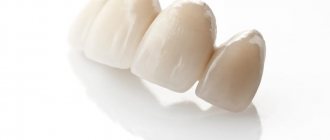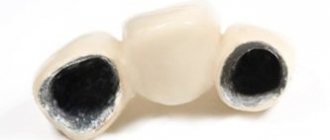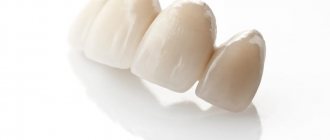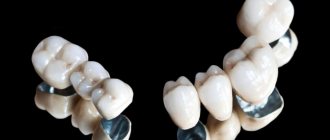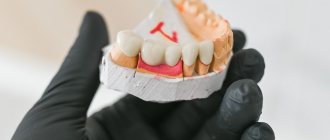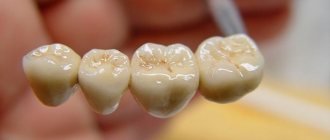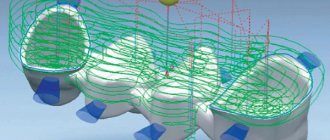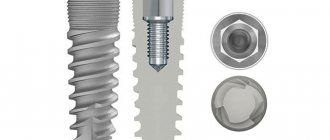Treatment guarantee
There are two types of guarantees that the doctor of our clinic is guided by when performing the full scope of services to restore your dental health - unconditional (mandatory) and predictable. The warranty period for any treatment begins from the moment the service is provided and requires you to comply with the conditions for proper care of your teeth and installed restorations (filling, prosthesis, veneer, etc.).
Projected guarantees for treatment
The doctor identifies the specifics of your case and, based on his experience and available treatment technologies, informs you about the service life of a filling, veneer, crown or prosthesis. When the warranty period is difficult to determine (hygienic cleaning, surgery, whitening, etc.), the doctor will notify you in advance about the success rate of this procedure.
What is the success rate of procedures at the Dent-a-med clinic?
- 95% of successful cases of root canal treatment using filling
- 100% - with in-office whitening of 2-8 shades, depending on the structure of your enamel and the chosen system
- 90% – elimination of gum and periodontal inflammation (with mandatory adherence to the doctor’s recommendations at home)
The success rate of treatment is influenced not only by the quality of materials and the skill of the doctor, but also by the condition of your teeth and health, which is why we carry out diagnostics so carefully. During the warranty period, any defect that arose through no fault of yours will be corrected free of charge (minor defects, a filling has fallen out, a prosthesis has been damaged). If you experience discomfort at the end of the warranty period, we will eliminate it at a 30% discount.
Unconditional guarantees for treatment at Dent-a-med
This type of guarantee is always provided and without any conditions. This is a requirement of the Federal Laws “On the Protection of Consumer Rights” (No. 2300-1 dated 02/07/1992) and “On the Fundamentals of Protecting the Health of Citizens of the Russian Federation” (No. 323-FZ dated 11/21/2011), as well as standards for the provision of medical care and patient management protocols , approved by orders of the Ministry of Health of the Russian Federation.
Based on legal requirements, you are guaranteed:
- providing complete information about the diagnostics performed
- holding a consultation or consultation
- implementation of procedures by doctors of appropriate qualifications
- keeping track of your health status
- establishing a complete diagnosis with detailed recommendations
- calculation of the total amount upon completion of the treatment plan
The safety of the intervention is guaranteed by compliance with sanitary and epidemiological requirements and the use of only technologies tested and approved by the Ministry of Health of the Russian Federation. We select anesthetics taking into account age and contraindications, so the treatment is safe for your health and as painless as possible. To prevent undesirable consequences, a series of follow-up examinations is prescribed. Free preventive examinations are also available at the Dent-a-med clinic.
In our dentistry, the quality of work is controlled. We will take into account your wishes and carry out dental restoration in compliance with the standards of domestic and European dental practice. We will take into account the objective state of your health so that the installed restorations last longer than the warranty period.
How to protect yourself from medical mistakes
Poor-quality dentures are, as a rule, evidence of the unprofessionalism of the doctors who created and installed them. This may also indicate that low quality materials were used in their manufacture. However, the problem can often be avoided if the patient initially goes to a clinic with a good reputation, where experienced doctors work and has its own dental laboratory equipped with the latest technology. We also provide a guarantee of work, compliance with ethical standards and legislation.
When contacting dentistry, do not be shy or lazy to request quality certificates and licenses. Make sure that all doctors have specialized education and qualifications: for example, prosthetics should be performed by an orthopedist, and it’s good if he is also a gnathologist, then the prosthetics will not only be beautiful, but also truly functional.
Be sure to conclude an agreement with the clinic, which will spell out specific services, deadlines for their implementation, responsibilities of the parties and warranty obligations. If you do not have the signed original contract in your hands, then it will be very difficult and sometimes even unrealistic to prove something later in the event of problems.
Remember that the warranty and the service life of the prosthesis are two completely different things. The guarantee is given for the prosthesis itself (that is, relatively speaking, for the material), as well as for the work of doctors, that is, for the service itself. But the service life is determined by the qualities and characteristics of the materials from which the dentures are made. If it is plastic, then the service life does not exceed 3 years, if it is zirconium dioxide, then it can be more than 15 years. The actual duration of operation, as a rule, exceeds the warranty period.
You have the right to demand compensation for damage, treatment of the tooth, alteration of the structure, or return the money for it only when, within the specified warranty period, it turns out that due to the fault of the dentists, you received poor-quality dental prosthetics. If no guarantees are specified, then the law stipulates that claims for such services can be made no later than 2 years from the date of their provision.
Is it possible to repair metal-ceramic crowns?
In a very small number of cases! There is a small chip in the corner of the crown, which can probably be polished. If the chip is larger, it affects the closure of the teeth (bite), if the chip is down to the metal, if the chip is on the contact surface - all these are indications not for repair, but for replacing the crown. In any case, everything is decided at a personal meeting.
METAL CERAMICS FOR TEETH. What are the stages of prosthetics?
At the Belgravia Dental Studio clinic, we install metal-ceramic crowns of ideal quality, following all treatment protocols.
- First, preparation before work - diagnostics: computed tomography. Only in our clinic, Diagnocat artificial intelligence is used for CBCT analysis! The program uses 3D images to determine the condition of the teeth and helps the doctor plan treatment.
- Preparation - grinding down the tooth for a crown. A very important stage! We'll tell you about it separately.
- Taking impressions, ordering a crown in the laboratory. While the restoration is being made, you will receive temporary crowns. You will need to wear them for about 2 weeks (average duration) while the permanent crowns are made in the laboratory.
- Fitting. The new restoration needs to be functional (not too high or low) and look natural in the dentition. We’ll also tell you more about fitting.
- Installation of ready-made structures. At this stage, we also use magnification to create an ideally tight and high-quality connection between the crown and the tooth shoulder and place the crown securely. This will allow us to maintain tightness for many years and prevent tooth decay under the crown, as well as maintain healthy gums.
- Doctor's recommendations: care, home hygiene, professional hygiene and examination schedule.
Work examples
All works
Restoring chewing function with metal-ceramic crowns
Re-prosthetics with metal-ceramic crowns
Manufacturing of metal-ceramic fixed bridge prosthesis
Tooth restoration with a metal-ceramic crown
All works
Sign up for a consultation
three ROOTT specialists + diagnostics as a gift
Forecast of treatment results and guarantee
At the first appointment, the doctor conducts diagnostics, assesses the condition of the patient’s teeth, existing diseases, and pathologies. Based on its results, he determines a treatment plan and offers the patient possible methods. For each of the methods that can be used to solve dental problems, there is a certain probability of achieving the desired result. Assessing this probability, the doctor forms a forecast for eliminating pathologies and diseases. This forecast takes into account the risk of complications, adverse reactions of the body to the therapy, and other factors. Based on it, the doctor determines the warranty period.
Before starting to treat teeth or gums, the patient needs to discuss with the doctor possible prognoses when using certain methods, materials, and designs. Dentists at the DentoSpas clinic recommend choosing treatment plans that will provide the longest service life for the restored teeth.
At DentoSpas dentistry, there are official guarantees for endodontic, periodontal, orthodontic, and surgical treatment. We use certified and safe materials and designs, for which separate warranty periods are established. At the first appointment, after diagnosis, examination, and choice of treatment methods, our doctors provide patients with accurate information about the duration of the warranty and the scope of the warranty obligations.
Dental clinic "median"
Let's give a simple example: if the manufacturer of an orthopedic dental structure determines its approximate service life of 15 years, this does not mean at all that the clinic where the structure was installed is obliged to provide free services to the patient during this time. The clinic is responsible only for the work of its medical staff, so in this example the concept of “warranty period” comes into play - it will range from 1 to 3 years.”
A warranty case is a situation in which a product (filling, prosthesis, implant) fails during the warranty period. If this happens, the patient has the right to demand that the clinic fulfill its obligations - free replacement of the filling, restoration of the dental crown, repair or replacement of the brace system.
One of the few areas of dentistry for which clinics do not provide any guarantees is surgery.
What needs to be proven in court
To win in court, you need to prove several key facts:
- The clinic provided poor-quality dental services - because of this, your health was harmed.
- The first clinic is to blame for all this.
- Because of the harm caused, you incurred expenses - you will need to prove them: provide receipts for medications, examinations, appointments with other doctors.
If you manage to prove all this, most likely the court will rule in your favor and oblige the clinic to pay you compensation.
Warranties for dentures
The service life of dentures and the guarantee provided by the clinic are two completely different things, and when choosing structures for replacing teeth, you should remember this.
Unfortunately, the exact warranty periods are not specified anywhere. However, there are a number of documents that regulate the rules for the provision of medical services, the mandatory provision of warranties and the return of cost or adjustment of the product in case of damage due to the fault of the contractor. Among such documents are the law “On the protection of consumer rights”, “Rules for the provision of paid medical services”, as well as the law “On the fundamentals of protecting the health of citizens in the Russian Federation”. It is worth remembering that each clinic has its own guarantees for dentures, but most dentists announce the actual service life within approximately the same limits. However, there is a caveat: in all medical centers they will be able to replace or adjust your prosthesis free of charge only if the patient complies with all the instructions issued by the attending physician.
Classification of defects
All dental defects are divided into:
- Partial – when one or more teeth are missing.
- Complete – absence of all teeth in the jaw.
In turn, partial defects can be:
- Terminal – the last teeth are missing (for example, all molars on one side of the jaw).
- Included when the defect is limited distally (posteriorly) by the remaining teeth (for example, the first molar and second premolar are missing).
Also distinguished:
- Primary adentia is the congenital absence of a specific tooth. This may be either an impacted tooth that has not completely erupted and is located in the bone, or the absence of permanent tooth rudiments.
- Secondary adentia is the loss of teeth during the life of the body. Complete edentia in most cases is secondary.
Warranty
Regulations on warranty periods and service periods for dental services.
As a general rule, warranty periods and service periods are established for work (services) to provide dental care at CityDentaMed LLC.
Warranty periods and service periods for dental services performed for each patient are established by the doctor depending on:
- Clinical situation in the patient’s oral cavity;
- The presence or absence of concomitant diseases of the patient, which directly or indirectly lead to changes in the teeth and surrounding tissues;
- The patient's complete implementation of the treatment plan recommended by the doctor.
The guarantee is issued for treatment that is considered completed:
- For caries - after placing a permanent filling;
- For prosthetics - after permanent fixation of the manufactured structure or delivery of a removable one and registration of a warranty card.
Taking into account these circumstances, in a particular case, the warranty period and service life can be adjusted (reduced or increased) compared to the average, within the time limits established by CityDentaMed LLC, which is recorded by the attending physician in the warranty card.
If a patient discovers deficiencies in the work performed (service provided) during the established warranty period and service life, the patient must contact CityDentaMed LLC by phone or in person and, stating the essence of the comment, make an appointment with the attending physician.
If the doctor determines that these shortcomings are not related to the patient’s violation of the warranty conditions or operating conditions previously communicated to him, they must be eliminated by correcting or re-performing the work (providing the service) without additional payment.
Warranty obligations are fulfilled if the Patient complies with the following requirements:
- Implementation of the entire agreed treatment plan;
- Performing adjustments or other additional intervention in the work performed (service provided) only in CityDentaMed LLC;
- Regular implementation of professional oral hygiene activities, with the frequency specified by the doctor in the outpatient card, but at least 2 times a year and only at CityDentaMed LLC
Warranty obligations are terminated (not preserved) if the following circumstances occur during the warranty period:
- The emergence of new diseases in the patient, the development of existing diseases, or the occurrence of harmful external influences that directly or indirectly lead to changes in the teeth or surrounding tissues, incl. long-term use of medications for the treatment of other diseases;
- Patient's pregnancy;
- Failure of the patient to conduct a mandatory preventive examination, carried out once every 6 months, in the case of dental prosthetics supported by dental implants - once every 3 months;
- Failure of the patient to comply with the recommendations of the attending physician for the care of the oral cavity, the result of work (service);
- Failure to comply with the operating conditions of the work result (service)
CityDentaMed LLC does not bear warranty obligations when providing dental services to the patient in the following cases:
- Treatment of teeth previously subjected to endodontic treatment is carried out;
- It is impossible to carry out or the patient refuses to carry out diagnostic, measuring, control images;
- If there is an alternative treatment option, at the request of the patient, therapeutic and preventive measures are carried out that are not the most optimal in the opinion of the attending physician in this case (destructive forms of periodontitis, the impossibility of re-treating the root canals of the tooth, etc.)
- The patient does not agree with the rational prosthetic plan proposed by the orthopedic dentist in accordance with the calculation of the periodontal endurance of the supporting teeth, taking into account research data;
- The patient has an allergy or intolerance to drugs and dental materials approved for use on the territory of the Republic of Belarus;
- A prosthesis not manufactured (purchased) by CityDentaMed LLC is installed;
- When repairing a removable denture manufactured in another medical institution or with an expired warranty;
- Treatment of the patient was stopped not on the initiative of CityDentaMed LLC;
- Complications have arisen due to the patient’s fault: failure to maintain oral hygiene, failure to comply with prescribed treatment, late reporting of complications, etc.;
- Force majeure circumstances have arisen (accident, shock, natural disaster, etc.) that could affect the results of treatment.
Features of care
Article Expert
Popkov Sergey Yurievich Dentist-orthopedist, doctor of the highest category
Work experience: more than 14 years
Is there a guarantee for dental implants according to Russian law?
The guarantee is enshrined in the current legislation of Russia. The legal norm requires that the product defect be eliminated and services provided in full free of charge. Guarantees must be specified in the contract that dentistry enters into with a potential patient.
They will be provided by law subject to the following conditions:
- routine examinations with a doctor;
- strict adherence to hygiene rules;
- taking prescribed medications;
- timely treatment in case of complications.
According to the laws of the Russian Federation, it is not determined how many years the guarantee for implants is, so the clinic has the right to determine the period of free servicing.
Consumer rights
When carrying out a paid service for treating caries and installing a filling, many are interested in the question of how much the guarantee is for the filling.
The answer to this question should be found in the service agreement. Let's look at what problems should be corrected under warranty in a dental clinic. They are usually divided into essential and non-essential.
Minor shortcomings include:
- destruction of the edge seal;
- modification of the shade of the filling along the outer edge;
- recurrence of caries along the edge of the filling.
Such deficiencies refer to a violation of the aesthetic function of service provision. They do not cause inconvenience when biting and chewing food. They are usually corrected immediately, without leaving the dental chair.
The doctor must replace a poor-quality filling
The following are considered significant shortcomings:
- loss of filling material;
- loose condition of the filling;
- chipping of a small area of the tooth crown.
Such shortcomings, in addition to disruption of aesthetic function, imply the impossibility of using the tooth for its intended purpose. This occurs after complete or partial destruction of the dental filling.
Types of ceramic crowns
Each method of prosthetics has its own characteristics. There are several types of such crowns:
- pressed ceramics, which is produced in stages, which allows you to achieve fairly high quality without loss of aesthetics;
- zirconium dioxide crowns, which are well suited for prosthetics of chewing teeth. But it is better to restore the front teeth with metal-free material.
Pressed ceramic crowns are characterized by excellent strength and long service life. This allows the use of ceramic crowns on chewing teeth. The service life of the prosthesis is about 5–10 years. The crowns withstand various loads well, and small chips that occur during operation can be easily restored. In this case, the restored section does not differ from the rest of the structure. To install a prosthesis, minimal sharpening of your own tooth is required, which is a very positive point. The installation is not much different from the installation of metal and metal-ceramic structures. The process consists of the following stages:
- visual examination, drawing up a treatment regimen;
- preparation of the oral cavity;
- taking impressions;
- fabrication of the structure;
- fitting and fastening.
Installation of metal ceramics, what are the nuances?
You have decided that this material is the most suitable for you, which means that before installing it you need to be diagnosed and prepare the supporting teeth. Only after this will the orthopedist take an impression of the teeth that have been ground down. This is necessary for custom dentures to be made.
Metal-ceramics require more thorough turning than, for example, all-ceramics. This fact is due to the fact that the walls of metal-ceramic crowns have a minimum permissible width and are larger than ceramic ones. Most often, in preparation for prosthetics, the nerve is completely removed (depulped) and the dental canals are treated. Although this does not always happen.
There are cases when the supporting teeth are in satisfactory condition, then they remain alive. Most often, metal ceramics should be placed on a dental ledge. Simply put, when grinding dental tissue, the dentist forms a circular ledge from the bottom edge, which protects the gum from contact with the metal frame. In this case, the risk of swelling, bleeding, irritation and allergic reactions is minimized.
How does a metal-ceramic tooth crown work?
When choosing a material for a new tooth, you first need to understand what it is. A melloceramic crown is a metal cap on which ceramic mass is applied. In a more “advanced” version, ceramics are also applied to the area that comes into contact with the gum, preventing it from turning dark.
Indications for prosthetics with ceramic crowns on a metal base:
- Loss of one, two or more teeth in a row - due to the strength of the metal, structures of any length are possible;
- End defects of the dentition - in the absence of one or more chewing units;
- Any other situations in prosthetics that require a combination of strength, aesthetics and reasonable price.
Based on the type of material, bases for dentures are:
| Kinds | Precious alloys | Non-precious alloys for metal-ceramic crowns | ||
| Metals | Gold-platinum, palladium, silver | Chrome-cobalt | Nickel-chrome | Titanium |
| pros | Durability. Strength. Suitable for allergies to other metals. | Low price tag | Low price tag | Full biocompatibility. Does not cause allergies. Strength. Durability. |
| Minuses | Expensive | Corrodes | Toxic, absorbed into the blood. Causes allergies. | Difficult to process due to high strength. Very expensive. Few doctors work with technology. |
Ceramics for dental crowns on a metal frame also come in different types—high and low temperature. There is little difference in appearance, the price is better than the low-temperature one, and the strength is better than the one produced at high temperatures.
Comparison of metal-ceramic crowns - materials and installation
| Comparison criteria/Types | On base alloys | On precious alloys | On a zirconium frame |
| Aesthetics | Below average, only suitable for side areas | Above average, can be placed in the smile zone | Good, can be installed in any area of the dentition |
| Service life | 10-12 years | 7-10 years | Up to 15 years |
| Dark stripes on the gums at the junction | No | Eat | No |
| Grinding a tooth before installing a metal-ceramic crown | Significant | Significant | Minor |
Fixation of the prosthesis is carried out in several stages:
- Preparatory
, when professional cleaning is performed and all foci of chronic infection are eliminated: carious cavities, periodontal disease. Next, prepare the base for the dental crown - grind the tooth if its coronal part is intact. Or they refill the canals, fixing the stump tab in them, if only the root remains. At the end, impressions are taken. - Laboratory
, when, based on the impressions taken, a prosthesis is made for the period of production of a permanent one and fixed. In the meantime, the metal frame is cast, tried on, checked for fit, corrected, and color selected. Then, in the same laboratory, ceramics are applied to the frame. - Final
, when the finished structure is attached to a special adhesive, for example, containing fluorine to protect fabrics from destruction.
Financial issue: cost of a metal-ceramic crown
These products are considered inexpensive. The size of the investment depends on the type of material from which the metal frame is made. What to expect in Moscow - below:
| Price | On base alloys | On precious alloys | On a zirconium frame |
| On the dentures themselves | 7,000-10,000 rubles | From 18,000-25,000 rubles | From 25,000 rubles |
| Turnkey works | 10,000-15,0000 rubles | 23,000-32,000 rubles | From 35,000 rubles |
Contraindications
Relative
the procedure can be carried out with extreme caution
- Inflammation in the active phase;
- mixed bite (possibly after orthodontic treatment;);
- teeth of different sizes;
- teeth too small.
Absolute
the procedure is strictly prohibited
- Bruxism;
- thinned enamel;
- weak support units;
- periodontal pathology;
- tooth mobility;
- allergy to metal.
